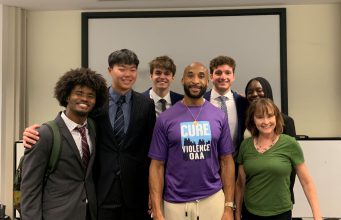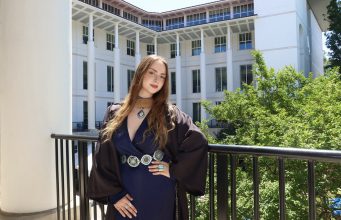Emory University’s Goizueta Business School is proud to announce the winners of the fourth annual John R. Lewis Racial Justice Case Competition.
Goizueta alumnus Willie Sullivan 21MBA spearheaded the first John R. Lewis Racial Justice Case Competition (JLCC) in 2021. The competition examines how companies can address racial injustice within their organizations and industries. The event and overall initiative honors the legacy of the late Congressman John R. Lewis while serving as a platform for business students and national organizations to forge a path forward to achieving racial equity.
The winners will share half of their monetary winnings with a nonprofit organization of their choice devoted to racial equity and/or justice.
First Place ($20,000)
Rice University: Prosperity Without Prejudice
Winnings will be shared with Operation Hope
– Dzidefo Ababio 25MBA
– Damieanus Ochola 25MBA
– Talor Thompson 25MBA
– Dominique Wilson 25MBA

Second Place ($8,000)
Georgia Tech: Diversity Defenders
Winnings will be shared with Ewing Marion Kauffman Foundation
– Pranav Batchu BSCS25
– Turner Davis 27BSBA
– Victor Huang 27BSBA
– Druvitha Lokasani BSIE26

Third Place ($3,000)
University of Virginia: The Social Innovation Group
Winnings will be split with HoPe: The Hispanic Organization Promoting Education
– Jillian (Jill) Howland 25MBA
– Luis Otero 25MBA
– Austin Paul Roye 25MBA
– Zuhayr Shaikh 25MBA 25MD

Since launching four years ago, the John R. Lewis Racial Justice Case Competition has engaged over a thousand students representing nearly 100 universities, generated 50 corporate action plans, and granted over $125,000 in grants to nonprofits advancing racial and economic justice. The final event took place at The Gathering Spot in Atlanta, a civically-minded event space focused on building community between diverse stakeholders. This year, the competition hosted over 120 in-person attendees and over 350 more via livestream.
“As the Managing Director of the John R. Lewis Racial Justice Case Competition, my greatest hope is that it serves as a catalyst for future business leaders to embrace their responsibility in advancing racial equity,” says Maya Dantzler 24MBA.
This competition is not just about generating ideas; it’s about fostering a sense of ownership and empowerment. It’s about recognizing that each of us has the power to drive meaningful change and create a more just and inclusive world.
Maya Dantzler 24MBA
Students and leaders continue to see the case competition as an invaluable opportunity to get involved and drive change. In fact, this year, the initiative saw a 25% rise in applications to compete. The pool was narrowed to 15 teams of students representing 13 leading universities across the country. Those schools included Emory University, Duke University, Columbia University, Cornell University, University of Virginia, Georgia Institute of Technology, George Washington University, Carnegie Mellon University, Rice University, Washington University, Boston University and University of Rochester.
Continuing a Legacy of Change-Makers
During the John R. Lewis Racial Justice Summit, three student finalist teams shared bold, actionable, and innovative plans. Their proposals all addressed issues of racial inequity for this year’s partners Delta Air Lines, First Step Staffing, and Taco Bell. Partner organizations asked students to tackle complex questions such as: “How can Delta Air Lines address climate equity?,” “How can First Step Staffing create pathways to economic opportunity and mobility for women of color?,” and “How can Taco Bell authentically attract more Black consumers?” An esteemed panel of judges reviewed each finalist presentation to determine the overall champion.
Lynne Segall, associate dean for management practice initiatives and the competition’s faculty advisor notes, “The conversation around racial justice has shifted significantly since 2020 and yet the structural issues persist, making the John R. Lewis Racial Justice Case Competition as relevant as ever.”
This competition and summit connects student leaders with business leaders in a meaningful way to focus on bold initiatives and actionable change. Once again, these student leaders have given our sponsors a lot to think about and act on.
Lynne Segall
This year’s competition also brought together leading faculty, business, and community leaders for discussion panels to explore initiatives, emerging ideas, and actionable insights for a more equitable future.

Fearless Dialogues
Featuring Gregory C. Ellison II, PhD, founder of Fearless Dialogues and associate professor, Candler School of Theology
Making Inclusion Last: A conversation about strategies and practices for enduring inclusion in business
Featuring Dane Mathews, chief digital officer of Taco Bell and Omar Rodríguez-Vilá, professor in the practice of marketing, Goizueta Business School
Prioritizing Racial Equity Panel: Why should companies commit to sustainable change?
Featuring Ashley Black, managing director, equity strategies, Delta Air Lines; Kellie Brownlow, chief mission officer, First Step Staffing; KT Thornton, chief equity, inclusion and belonging officer at Taco Bell; moderated by Wes Longhofer, associate professor of organization and management
Insights to Actions: Meaningful steps for a better tomorrow
Featuring Sara Prince, senior partner, McKinsey & Company

Jerrick Lewis, nephew of John R. Lewis and executive director of the John R. Lewis Legacy Institute, presented the competition awards.
“This is what my uncle wanted,” says Lewis. “This is what he meant when he talked about getting into good and necessary trouble.”
“The John R. Lewis Racial Justice Case Competition is such a wonderful example of what we at Goizueta are called to do,” commented John H. Harland Dean Gareth James in his closing remarks. “We aim to bring insights to business to drive it forward, engage students in experiential learning, and build a better, more inclusive society. Business has immense power, influence, and resources—and because of this, we can drive real change.”
“It takes a village, and we’re so grateful to all the partners who stepped up to become agents of change and make this event possible.”
Watch the 2024 summit here.
The John R. Lewis Racial Justice Case Competition is part of Goizueta’s Business & Society Institute. The Institute represents an elevated commitment by Goizueta Business School to address complex challenges confronting people, the planet, and the business community. To learn more about the John R. Lewis Case Competition and how you can get involved, visit Emory.biz/jlcc.











